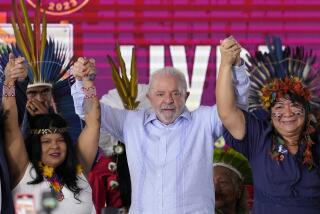Better Way to Deal With Cuba
- Share via
This week, with Cuba for the first time hosting the annual summit of Latin and Iberian peninsula nations, dictator Fidel Castro could be forgiven for feeling a sense of acceptance by his increasingly democratic brethren in Spain, Portugal and the nations of Latin America. Instead of camaraderie, however, he got lectures from many of the participants on the need for democracy and respect for human rights.
Not only that, the summit shined light on Cuba’s increasingly active domestic opposition to the Communist regime. Presidents, premiers and foreign affairs ministers rushed to meet with Elizardo Sanchez, a former political prisoner long seen as Cuba’s standard for democratic values and courage.
From a U.S. perspective, the summit showed once again the obsolescence of Washington’s Cuba policies. At the end of the century, the United States retains a policy of boycotts and embargoes meant for the Cold War instead of the constructive engagement that marks U.S. policy toward other troublesome governments. There is no justification for continuing full-bore with a policy whose sole purpose is to pander to the most reactionary forces of the Cuban exile community in Miami. This group is far from mainstream America regarding support for the U.S. embargo of Cuba. A recent Gallup poll shows that 51% of Americans want to end the embargo; 42% would retain it.
“True democracy,” Portuguese President Jorge Sampaio said in a speech at the summit, “requires respect for individuals, for their fundamental rights, for their capacity for free initiative--in short, respect for their freedom.” Many other leaders spoke out in similar terms, though Castro did find a pal in Venezuela’s elected strongman, Hugo Chavez. Even President Ernesto Zedillo of Mexico, the only country in the Western Hemisphere that never broke diplomatic relations with the Communist island, said in his speech, “There can be no sovereign nations without free men and women who can fully exercise their basic freedoms: the freedom to think and opine, the freedom to act and participate, the freedom to dissent, the freedom to choose.”
The leaders of this summit have shown the world the right way to deal with Cuba. It is high time for a radical change in U.S. policy.
More to Read
Sign up for Essential California
The most important California stories and recommendations in your inbox every morning.
You may occasionally receive promotional content from the Los Angeles Times.













